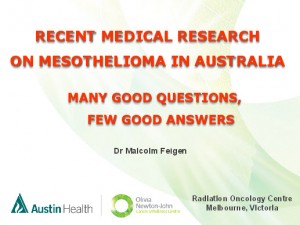 A radiation oncologist in Victoria, Australia says a tested radiation technique may improve the life expectancy for mesothelioma patients. The technique involves administering high doses of radiotherapy to decrease the activity of tumor masses. These high doses are considered much higher than conventional doses which, in many cases, offer poor results.
A radiation oncologist in Victoria, Australia says a tested radiation technique may improve the life expectancy for mesothelioma patients. The technique involves administering high doses of radiotherapy to decrease the activity of tumor masses. These high doses are considered much higher than conventional doses which, in many cases, offer poor results.
Radiotherapy (another term for radiation therapy) is a form of intense energy generated by a radioactive substance, such as cobalt, or by specialized equipment, such as an atomic particle (linear) accelerator. Radiation preferentially kills cells that divide rapidly and cells that have difficulty repairing their DNA (nuclear material).
Cancer cells divide more often than normal cells and often cannot repair damage done to them by radiation. Therefore, cancer cells are more likely than most normal cells to be killed by radiation. Nonetheless, cancer cells differ in how easily they are killed by radiation; some cells are very resistant and cannot be effectively treated with radiation.
Mesothelioma is by far one of the most aggressive forms of cancer and the most difficult to treat. However, Dr. Malcolm Feigen, research team leader and oncologist at Victoria’s Austin Health Centre, feels strongly that he and his team have it right—higher doses of radiotherapy is the answer for many mesothelioma patients.
In an ABC News Australia report, Dr. Feigen says:
“Gradually with new technologies and better equipment we’ve been able to increase our doses and look at the results by doing PET scans before they start the radiotherapy and PET scans after they’ve finished to see what difference we’ve made. We’ve been very impressed that in most cases there’s a considerable improvement in the activity of the tumour masses that we’ve given high doses of radiotherapy.”
“And most patients have got through the course of treatment with no major side effects and some have had long-term benefits,” he says.
According to Dr. Feigen, patients that have been treated with chemotherapy alone reap mostly short-term benefits and then the cancer returns. However, with radiotherapy, he says, it doesn’t come back in the same area and “if we find patients early enough we may be able to stop any further developments of their disease.”
Dr. Feigen’s pilot program included 13 mesothelioma patients. Most had surgery prior to radiotherapy, while others had chemotherapy before and after the high dose radiation treatments. According to Feigen, his radiotherapy treatment has given mesothelioma patients an average of “two years more to live.”
“Some patients go on to have a number of good years before sometimes the tumour comes back in areas that we haven’t been able to give radiotherapy to,” he says.
According to Dr. Feigen, having chemotherapy before or after the new radiotherapy treatment does provide an additional benefit, but not always. “We think that most of the symptoms are relieved more effectively by high doses of radiotherapy than these other alternatives,” he says.
In addition to mesothelioma, high dose radiotherapy (or High-dose rate (HDR) radiation therapy) is used by many oncologists to treat gynecological cancers, prostate cancer, and others.
If you have been diagnosed with mesothelioma, talk to an attorney about your legal rights as a mesothelioma victim. MRHFM is the largest firm exclusively devoted to helping mesothelioma victims and their families, so our experienced attorney’s can help you understand your legal rights and the asbestos laws in your state.
Contact the legal team at MRHFM today. Email us anytime or call 866-373-5000 to discuss your case.
Sources
American Cancer Society’s Guide to Complementary and Alternative Cancer Methods
American Cancer Society & David S. Rosenthal, MD, Atlanta, GA
Australian Broadcasting Corporation (ABC) News
http://www.abc.net.au/news/
Rex Healthcare | Hospital, University of North Carolina
Rexhealth.com
The Merck Manual Home Health Handbook
Merck Research Laboratories, Whitehouse Station, NJ


No comments yet. You should be kind and add one!
By submitting a comment you grant Mesothelioma Blog – Information, Research, News, Answers, Legal a perpetual license to reproduce your words and name/web site in attribution. Inappropriate and irrelevant comments will be removed at an admin’s discretion. Your email is used for verification purposes only, it will never be shared.